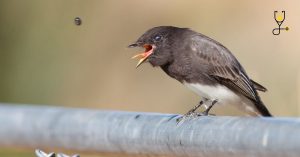For many bird owners, the arrival of an egg laid by their pet can be a momentous occasion – and one that requires some special care to ensure a healthy outcome. While these eggs may look small and insignificant on the outside, inside is a delicate process of development as your pet’s young comes into existence. If you are dealing with this situation, it is important to know what needs to be done in order for your feathered friend and its baby-to-be to have the best chances of survival. Read on for essential information about how to take care of both parents during the breeding season, and learn tips for preparation before egg laying begins.
1. Preparing for Egg Laying
When your pet bird is expecting, it is important to provide a safe and comfortable environment before the egg-laying process begins. This means providing extra food, fresh water, and adequate cage space. It also involves finding a place in the cage where she can build her nest without any disruption or interference from other birds or pets. Additionally, make sure that the temperature of the room stays consistent and that drafts are avoided. Taking these steps will help ensure that your feathered family has a successful breeding season and that their eggs have the best chances of hatching safely.

2. Monitoring During Egg Laying
Once your pet bird starts laying eggs, it’s important to closely monitor her behavior and physical condition. If she appears to be stressed or unwell, it is a good idea to take her to the veterinarian for a check-up. Additionally, keep an eye out for any signs of egg binding, which can occur if the egg does not pass easily through the reproductive tract. Other warning signs include decreased appetite and lethargy.
3. Caring for Eggs
While your pet bird is laying eggs, it is important to provide her with extra calcium and vitamin supplements in order to help ensure the healthy development of the chicks inside the eggs. It is also important to regularly turn the eggs (at least twice a day) so that each side receives equal heat from their mother’s body – this helps promote even growth and prevents too much development on one side of the egg.

4. Assisted Hatching
In some cases, a pet bird’s eggs may require assistance in order to hatch successfully. If this is necessary, it is important to make sure that you are working with an experienced vet who can provide safe and effective techniques for helping the chicks break out of their shells. In some cases, your vet may even suggest using hormone injections or other artificial methods in order to stimulate hatching. No matter what method is chosen, always make sure that you follow your veterinarian’s instructions carefully so that both parents and baby birds have the best chances at survival!
5. Caring for Hatchlings
When the time comes for your pet bird’s hatchlings to emerge from their eggs, it is essential to provide extra care and attention. This means keeping a close eye on the babies to make sure that they are eating enough and staying warm. You may want to invest in special lights or heating pads in order to keep the nest area at just the right temperature for them. Additionally, make sure that you are offering fresh food and water at all times so that your little ones stay nourished and healthy!
6. Bonding with the Chicks
Finally, it is important to provide your pet bird and her chicks with plenty of time to bond. This means allowing them to spend quality time together in a safe and secure area where they can interact and get to know each other. Additionally, make sure that you are providing plenty of mental stimulation for both parents and babies by offering toys, treats, and different types of perches. Taking these steps will help ensure that your feathered family has a strong connection with one another so that they can raise their young successfully!
7. Looking After Your Pet Bird
Remember, the key to a successful breeding season is providing your pet bird with excellent care and attention throughout the entire process. Make sure that she always has access to fresh food and water as well as plenty of cage space. Additionally, provide her with special supplements and vitamins if necessary so that she can remain in good condition while laying eggs. Finally, be sure to monitor her behavior closely during egg-laying and hatching so that you can quickly identify any potential problems or complications.
Also read: All Bird Health Issues You Should Know About
8. Regular Check-Ups
It is also recommended that you take your pet bird for regular check-ups with a vet in order to ensure that she remains healthy and fit throughout the entire process. During these visits, the vet will be able to provide advice on any special dietary requirements as well as suggestions for supplements that can help keep your pet bird strong and energetic. Additionally, if there are any signs of ill health or distress, it is important to seek professional medical attention immediately. By following all of these steps and taking proper care of your feathered friend, you can give her eggs the best chance of hatching safely!
Also read: Why Birds Need Regular Vet Visits!
Happy breeding season! 🙂
Conclusion
Breeding season can be an incredibly exciting and rewarding experience for pet bird owners. However, it is important to make sure that you are prepared for the entire process by providing your feathered friend with the best care possible throughout the entire journey. Make sure to provide plenty of food and water, keep her nest area warm, and monitor her behavior closely – these steps will ensure that both parents and babies have successful hatching! Additionally, don’t forget to take your pet bird for regular check-ups with a vet so that any potential problems or complications can be addressed quickly. Finally, enjoy bonding with your new chicks and watching them grow up happy and healthy! Good luck!
Frequently Asked Questions
Depending on the specific needs of your pet bird, you may want to provide her with special supplements and vitamins in order to ensure that she remains healthy throughout the process. Speak with your vet for advice on which products might be suitable for her individual requirements.
It is recommended that you take your pet bird for regular check-ups with a vet in order to monitor her health throughout the entire process. Speak with your vet about how often these visits should occur – typically it is suggested that they happen at least once every two months or so.
Providing your pet bird and her chicks with quality time together in a safe, secure area is key to establishing a strong bond between the two. Additionally, make sure to provide plenty of mental stimulation for both parents and babies by offering toys, treats, and different types of perches. This will help create an environment where they can get to know each other better!
A: If your pet bird’s eggs do not hatch, you may need to take her for a check-up with the vet in order to identify any potential underlying problems. Additionally, make sure that she has access to appropriate nesting materials and food so that she can remain healthy and strong throughout the process. Finally, try providing extra warmth and support until the chicks eventually emerge from their shells!
In addition to providing your pet bird with regular check-ups and appropriate supplements, make sure that she has access to plenty of fresh food and water as well as a secure, comfortable nesting area. Additionally, monitor her behavior closely throughout the entire process in order to identify any potential problems or complications early on. With all of these steps taken care of, you’ll be able to give your feathered friend and her chicks the best chance at successful hatching!








